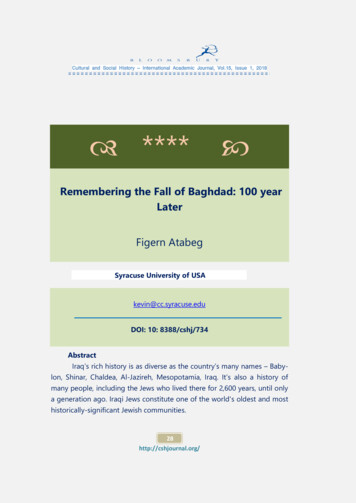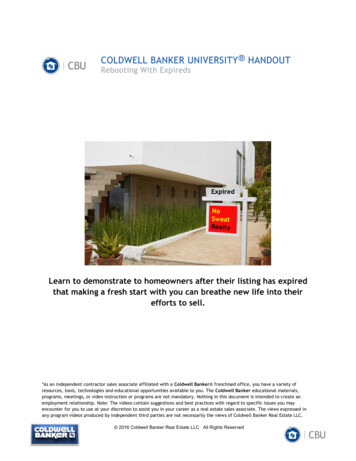
Transcription
Cultural and Social History – International Academic Journal, Vol.15, Issue 1, 2018 **** Remembering the Fall of Baghdad: 100 yearLaterFigern AtabegSyracuse University of USAkevin@cc.syracuse.eduDOI: 10: 8388/cshj/734AbstractIraq’s rich history is as diverse as the country’s many names – Babylon, Shinar, Chaldea, Al-Jazireh, Mesopotamia, Iraq. It’s also a history ofmany people, including the Jews who lived there for 2,600 years, until onlya generation ago. Iraqi Jews constitute one of the world's oldest and mosthistorically-significant Jewish communities.28http://cshjournal.org/
Cultural and Social History – International Academic Journal, Print ISSN - 1341-0791Keywords: Iraq, remembering, history, social cultureIntroduction: This Jewish community first settled around 586 BCEwhen Judah was defeated by King Nebuchadnezzar. Nebuchadnezzar captured the Jews and took them to Babylon as slaves. In turn, less than half acentury later, the kingdom was conquered by the Persians – the Jews wereallowed to return to Judea, but most preferred to remain. From the Babylonian period until the twentieth century, Iraq thrived as a centre of Jewishlearning. After the fall of Jerusalem in 70AD, the kingdom took in manyrefugees from current day Israel and became the centre of decision making in Jewish affairs. Christianity reached Mesopotamia in the first centuryAD and the religions lived side by side. The Babylonian academies were attheir height in the third century AD, which marked the beginning of a newera for the Jews. This was when they established the style of learningfound in the Talmud, a book of legal scholarship with folk stories, jokes,debates and disagreements in which every imaginable topic is covered,from legal debate, theology and music to trapping mice.Around this time, Upper Mesopotamia came to be known as Al-Jazirah inArabic (which means “The Island”, in reference to the land between the Tigris and Euphrates rivers), while Lower Mesopotamia came to be known asIraq-i (meaning “the land of the Arabs”). Islam arrived in the 630s and theJewish community became part of the Muslim caliphate. The city of Baghdad was built in the 8th century and soon became the primary centre ofthe Muslim world during the centuries of the Islamic Golden Age. All minorities had to pay a poll tax and experienced some discrimination, but as“people of the book”, the Jews had a large and well-regulated place in society. The Jewish community survived the Mongol invasions of the MiddleAges and fared well under the Ottoman Empire (1533–1918). The community established modern schools in the second half of the 19th centurywith funding from French philanthropists.29http://cshjournal.org/
Cultural and Social History – International Academic Journal, Vol.15, Issue 1, 2018After the First World War, the Ottoman Empire was divided up and theBritish Mandate of Mesopotamia was established by the League of Nations, later to be called Iraq. A war of rebellion consumed vast resourcesand set the people of Iraq against one another. But Winston Churchill wasdetermined to hang onto the territory, keenly aware of how much oil wasneeded to power a fleet and that Britain would benefit from controlling anopen trade route to India.In 1921, Britain imposed a Hashemite monarchy on Iraq and defined thecountry’s territorial limits. After hundreds of years as institutionalised second-class subjects, the Jews started to play an important role in runningthe country. The first minister of finance was a Jew, Sassoon Eskell. However, this drove a wedge between Muslims and non-Muslims. The minoritieswere regarded as instruments of European policy.After 1932, the British mandate officially ended, making Iraq the only independent Middle Eastern country. It became a magnet for Arab intellectualdissidents and especially a large contingent of Palestinian teachers, whotook refuge in Baghdad. They moved the climate of opinion and attitudeshardened towards the British, with their hold on Iraqi oil and their backingfor the creation of a Jewish state in Palestine. Iraq’s own monarchy wasgenerally seen as a puppet regime serving the British.In this atmosphere, the German Nazi party courted the opposition. MeinKampf was translated into Arabic, radio propaganda from Berlin blared inmarket places comparing Jews with worms, and the slogan “Allah in Heaven and Hitler on the ground” became familiar. Most significantly of all, theGrand Mufti of Jerusalem – whose campaigns of violent popular resistanceagainst the proposed Jewish State in Palestine were funded by the Nazis –came to Baghdad to inspire politicians and train young men.30http://cshjournal.org/
Cultural and Social History – International Academic Journal, Print ISSN - 1341-0791Following a coup in 1941, driven by Nazi sympathisers, a skeleton Britishoperation was mounted and succeeded in taking back the country. Theking was reinstated, much to the fury of those who thought they had gotrid of the imperialists. The Jews were seen as British sympathisers and avicious riot against the community followed – the Farhud (which roughlytranslates to mean “the violent dispossession”); 180 were killed and 2,000were injured in this two-day massacre, known as Baghdad’s Kristallnacht.The Jews of Baghdad never entirely regained their confidence althoughpeace and prosperity returned to Iraq while the war raged elsewhere. AndJewish fears were realized when in 1948, Iraq joined the Arab League statesthat went to war to stop the creation of Israel. When they lost, both ordinaryIt is not that the ancient ritual process, the Comus honoring the god of thename, was the source of this great art form- for comedy has arisen inmany parts of the world where the Greek god with his particular form ofworship was unknown- but that Comus was a fertility rite and the god itcelebrated a fertility god, a symbol of perpetual rebirth, eternal life. [1]Northrop Frye also associates comedy, particularly romance, with theabundance and plenty of the Golden age. The romance quest, according toFrye, leads towards "the victory of fertility over the waste land." Here, byfertility Frye means "food and drink, bread and wine, body and blood andthe union of male and female." Romance, according to Frye, is "the nearestof all literary forms to the wish-fulfilment dream." [2] It is a nostalgic formwhich seems to be searching for some "imaginative golden age in time orspace." However, as Frye argues, the idealising romance narrative is not asan escape from reality, but as a "transformation of ordinary reality."While in the mythical Golden age, "The fertile earth as yet was free,untouched of spade or plow, And yet it yielded of itself of every thingsenow," (115/116) the fate of those living in 'ordinary reality' is to have to31http://cshjournal.org/
Cultural and Social History – International Academic Journal, Vol.15, Issue 1, 2018work in order to achieve victory over the wasteland. In the postlapsarianage we are reminded of God's injunction thatCursed is the ground for thy sake; in sorrow shalt thou eat of it all thedays of thy life; Thorns and thistles shall it bring forth to thee; and thoushalt eat the herb of the field; In the sweat of thy face shalt thou eat bread,till thou return unto the ground; for out of it was thy taken: for dust thouart and unto dust shalt thou return. (Genesis 3 17-19)Once nature provided humanity's every material need at no physicalcost to man. Now he must enter into a relationship with the land in orderto feed his requirements. In order to consume he must also produce. Aspart of the progression from dust to dust mankind makes his impression inthe life cycle by producing children and by wresting the fruits of nature bythe sweat of his brow. Instead of being a passive recipient he is an activeagent of transformation and part of the transformation process itself. He ismatter and he transforms matter. For Mikhail Bakhtin the participation ofman in this cosmic cycle of continuing change is part of carnivalesque vitality:Abundance derives from transformations of matter carried out inwork to renew the body. These processes include the agricultural cycle.butchering cooking and consuming of meat; eating digesting and defecation.Carnival represents a dialectical exchange between life and death,achieved through positive and negative transformations of matter. [3]John Locke also regards this agrarian relationship with nature as aform of economic paradise.This is certain, that in the beginning, before the desire of havingmore than men needed had altered the intrinsic value of things, which depends only on their usefulness to the life of man, or had agreed that a littlepiece of yellow metal, which would keep without wasting or decay, shouldbe worth a great piece of flesh, or a whole heap of corn, though men hada right to appropriate by their labour, each one to himself, as much of the32http://cshjournal.org/
Cultural and Social History – International Academic Journal, Print ISSN - 1341-0791things of Nature as he could use, yet this could not be much, nor to theprejudice of others, where the same plenty was still left, to those whowould use the same industry. [4]Bakhtin's folk culture and Locke's almost mythical economic paradisereplace Ovid's Golden Age with a new form of Golden age in which labouris a necessary part of human relations with nature. The enjoyment of thematerial world is directly related to the effort which has gone into producing it. As Marx puts it:Labour is, in the first place, a process in which both man and Natureparticipate, and in which man of his own accord starts, regulates, and controls the material re-actions between himself and Nature. [5]For both Bakhtin and Locke, the Fall is brought about by replacementof an agrarian economy with a money based one, the projection of this desire for material objects onto the "little piece of yellow metal," and the desire that the excesses of labour should be stored in the coin in the form ofprofit. In Ovid's mythical first age the fall from the Golden age of plentywas driven by "craft, treason, envy, pride and wicked lust." Man began totrade with ships and to divide up the common land and mine, not only forfood, butFor riches couched and hidden deep in places near to Hell,The spurs and stirrers unto vice and foes to doing well. Then hurtful ironcame abroad, then came forth yellow gold, more hurtful than the iron far(157/160).I blow no subtle glass; expose no shipsTo threat'nings of the furrow-faced sea;I turn no moneys in the public bank;Nor usure private. (I i 30-36)Gold in Ovid's age is not money but food. In Bakhtin's folk culturetoo, it is "gay matter," the fruits of natural production which provide positive human experience. In Volpone, as we know, sustenance is not provideby food but by literal gold. Removing themselves from the festive cycle of33http://cshjournal.org/
Cultural and Social History – International Academic Journal, Vol.15, Issue 1, 2018production and consumption, the pair have replaced material objects ofnourishment with that "little piece of yellow metal" which now stands in forthe "great piece of flesh or the whole heap of corn." Gold and money nowstands in or substitutes for food. [6]In Bakhtin's theory of carnival, he argues that eating and drinkingsymbolise the struggle and victory of man over the world, a collective social triumph in wresting the fruits of the earth for consumption. "Everydaylife and consumption are not isolated from the labour and production process." [7] However, as he points out:If food is separated from work and seen as a private way of life, thennothing remains of the old images .Nothing is left but a series of artificialmeaningless metaphors. [8]That food in Volpone is not only separated from work, but is a metaphor for money, affirms this. The Golden Age that Volpone and Mosca create is one of artificial metaphor. Bakhtin's statement seems to suggest thatthe metaphor has lost its connection with the material and physical worldand become an arbitrary and abstract token- a free floating signifier. However I would argue that the metaphors are not meaningless. They work because the tricksters are able to find common ground between the Goldenage of natural plenty and the Golden age of a money economy. The golden hopes of the citizens of city comedy are that they, like those luckymythical citizens, can escape the Curse of Adam.Quicksilver in Eastward Ho!, like Volpone, wishes to evade the labourprocess. As the son of a gentleman his enforced apprenticeship offends hissense of status. He tries to persuade his industrious co-worker Golding toadopt his attitude to work:Why, do nothing, be like a gentleman, be idle; the curse of man is labour.Wipe thy bum with testons and make ducks and drakes with shillings. (I i114-116)34http://cshjournal.org/
Cultural and Social History – International Academic Journal, Print ISSN - 1341-0791Golding however has been well schooled in the Protestant work ethicand answersWhate'er some vainer youth may term disgrace, The gain of honestpains is never base;From trades, from arts, from valour, honoursprings.These three are founts of gentry, yea of kings. (I i 143-146)Honest labour for Golding is the cornerstone of advancement andmoral virtue. Quicksilver, on the other hand, shows his scatological contempt for the fruits of his master's labour by debasing them to the lowerbody. Bakhtin states that in folk cultureDung and urine lend a bodily character to matter, to the world, to thecosmic elements, which become closer, more intimate, more easilygrasped, for this is matter the elemental force, born from the body itself. [9]However, Quicksilver's unwillingness to work has removed him fromthis cycle. In Protestant polemic idleness is constantly associated with basematter. In the Puritan John Northbrooke's case, as he explains in his1577 Treatise wherein Dicing, Dauncing, Vaine Plays or Enterludes.are Reproved, labour is a duty and idleness is described in the language of thelower body, in the language of excrement and waste: "A slothful man is tobe compared to the dung of Oxen," they are "the dung and the filthe ofidleness" (Howard 27).In a similar way in Every Man In His Humour Brayneworme, in his disguise as an out of work soldier, is accused of idleness by Knowell in similarterms to those employed by Northbrook:Men of thy condition feed on slothAs doth the beetle on the dung she breeds inNot caring how the mettle of your mindsIs eaten with the rust of idleness. (II v 110-113 )The metaphor of consumption dominates this speech and connectseach image. The idle man feeds on sloth, the dung beetle feeds on dung35http://cshjournal.org/
Cultural and Social History – International Academic Journal, Vol.15, Issue 1, 2018and idleness feeds on man's "mettle." Immediately there is a suggestionthat the idle man consumes but he does not produce. In other words hegets something from nothing. Labour is required to reinstate the idle manback into the cycle of consumption and production.The word mettle has a double meaning in this context; it means boththe essence or quality of a person and a metallic substance. This is reinforced by the reference to rust which consumes the mind of the idle man.The reference to the dung beetle introduces a further level of meaning into the speech. It is suggested in this simile that the idle man, like the dungbeetle, consumes without producing. The dung beetle feeds on filth andproduces the same filth from which she then breeds. Like the idle man thedungbeetle bypasses the labour process. The traditional association "ofshiny metal with faeces, or of lucre with filth links the dung beetle with thecirculation of money. It may be seen as the Dukatensheisser or shitter ofducats" (Shell 12). While in Bakhtin's agrarian society dung symbolised thetransformative relationship between man and matter, in an emergent capitalist economy, matter and money become equated. Money is food anddrink and sex. Marx notes the productive power of money:That which I am unable to do as a man and of which therefore all myindividual essential powers are incapable, I am able to do by means ofmoney. money converts my wishes from something in the realm of myimagination, translates them from my mediated, imagined or desired existence into their sensual actual insistence- from imagination to life, fromimagined being into real being In effecting this mediation money is thetruly creative power. [10]This paper will now examine the mediating and creative power ofmoney in two city comedies: Thomas Middleton's A Chaste Maid in Cheapside and Ben Jonson's The Devil is an Ass. Both comedies present characters who are eager to remove themselves from the cycle of consumptionand production and avoid physical labour.36http://cshjournal.org/
Cultural and Social History – International Academic Journal, Print ISSN - 1341-0791In Gilbert Walker's "A Manifest detection of the most vile and detestable use of Dice -play, and other practices like the same," Walker outlines akind of catechism wherein R and M discourse. M explains to R the cheater's ability to counterfeit:For the first and original ground of cheating is a counterfeit countenance in all things, a study to seem to be and not to be indeed; and because no great deceit can be wrought but where special trust goeth before, therefore the cheater, when he pitcheth his hay to purchase his profit,enforceth all his wits to win credit and opinion of honesty and uprightness.the foundation of all those sorts of people is nothing else but meresimulation and bearing in hand. And like as they spring all from one root,so tend they all to one end : idly to live by rape and ravin, devouring thefruit of other men's labours. [11]In Middleton's A Chaste Maid in Cheapside the character Allwit, as hisname suggests, is one such cheater. To the community, he appears to bean honest and upright citizen. Blessed with bounty, he seems to epitomisea man reaping the reward of honest toil. In Psalm 128 the curse of labourgiven to Adam is transformed to a blessing to all those who are reconciledto their fallen state:Blessed is every one that feareth the Lord; that walketh in his ways.For thou shalt eat the labour of thine hands; happy shalt thou be, and itshall be well with thee. Thy wife shall be as a fruitful vine by the side ofthine house; thy children like olive plants round about thy table. (Psalm128 1-3)For Allwit, this is the "happiest state that ever man was born to"(I.ii.21). His material needs are more than met and his wife is about to produce her seventh child. Allwit's prolific excess might be read as a sign ofhis carnivalesque phallic power. He has entered the cosmic cycle of production and consumption on a grand scale. As Kurt Heinzelman argues:Labor is both economically and sexually potent. In economic discourse, labour always means masculine or male labor (to distinguish it37http://cshjournal.org/
Cultural and Social History – International Academic Journal, Vol.15, Issue 1, 2018from childbearing or female labor) Labor in the end is the economic expression of manhood. [12]However, Allwit's labour is neither economically or sexually potent.His wife may be a fertile vine, and he might rejoice in his groaning storecupboards, but the labour is out of his hands. Labour in Allwit's Goldenage is not redundant but invisible. His hoarded stores of coal and faggotsare the result of someone else's sweat. He enjoys the signs of work withoutexpending any himself. The fall from Locke's golden age economy where aman worked to have sufficient unto his needs to one in which value lies inthe objects of commodity rather than in the labour required to producethem is demonstrated in Allwit's gloating speech. His celebration of plentymoves from the festive symbols of abundance and winter cheer to thesigns of conspicuous consumption. Even his wife's grunting labour, thecurse of woman, is effaced by displaced from carnivalesque generativebody to a shop window display. The movement from material excess toprivate consumption is signalled by Allwit's phrase "I say nothing, but smileand pin the door." Allwit is able to evade the comic cycle of life by employing a middleman or substitute to do his work for him. Allwit's seeminglysexually potent economic labour is provided by another man: Sir WalterWhorehound.We are told in the first act of the play that Mrs Allwit exhibits a carnallonging for pickled cucumbers and the coming of her lover Sir Walter. Herhusband's servant Davy assures Allwit that the sight of the cucumbers willkeep his wife happy until she can have the real thing. The phallically symbolic cucumber represents the displacement of labour onto a substitute or'stand in.' First the cucumber represents the absent Sir Walter who in turn'stands in' for the anti-libidinal Allwit. Allwit is now removed from the cycleof production and consumption and his material needs are supplied by anintermediary or 'middleman' without the need for sweat or toil. Allwit rejoices that the knight "hath took that labour all out of my hands" (I.ii.51).He has all the pleasures of the world without getting his hands dirty: "like a38http://cshjournal.org/
Cultural and Social History – International Academic Journal, Print ISSN - 1341-0791happy man/ I pay for none at all, yet fools think's mine;/ I have the name,and in his gold I shine" (I.ii.38-40). Allwit basks in the reflected glory of SirWalter's status as a knight, as a rich man and as a figure of carnival festivity. He has replaced the appetites of the body and its material needs anddesires with a materiality that requires no physical expenditure and the final refrain of this speech where he sings "La dildo, dildo la dildo, la dildodildo de dildo" (I.ii.56) reinforces the separation between creative festivityand displaced desire. The use of the sexual stand in breaks the reciprocallink between man and matter and replaces it with a form of agent, representative or intermediary. In the same way the material nature of thecarnivalesque is fractured and replaced with a material sign or symbol, material goods.However, while labour might be economically and sexually potent(more than enough is needed to sustain a family), in some cases sexual potency exceeds economic sufficiency. According to Arthur Marotti, Touchwood Senior, "the comic avatar of Eros most vividly symbolises the powerof fertility present in Middleton's dramatic world." [13] This invocation offestive procreation is undermined though when we meet Touchwood whois bemoaning his excessive fertility which threatens to prove both his economic and physical ruin:Life every year a child and sometimes two,Besides drinkings abroad, that's never reckonedThis gear will not hold out. (II.i.15-17)Not only does his fertility cause the downfall of his family unit andthe "wenches" he has impregnated but it also becomes an anti-comicthreat in that it threatens to damage his "gear" and to delay the harvest,the symbol of rural festivity.I have such a fatal finger in such businessI must forth with't, chiefly for country wenchesFor every harvest I shall hinder haymakingenter a wench with child39http://cshjournal.org/
Cultural and Social History – International Academic Journal, Vol.15, Issue 1, 2018I had no less than seven lay in last ProgressWithin three weeks of one another's time. (II.i.59-63)In this play the sexual excesses of carnival activity and the resultingprogeny are not sources of festive celebration but of economic transaction. Touchwood sees the illegitimate child he has fathered as "a half ayard of flesh" and, relieved to be rid of it with just a small financial outlay,he remarks "and would I were rid of all the wares in the shop so" (II.i.99).The bawdy double meaning of wares and female genitalia links the child toa chain, not of consumption and production, cause and effect, but ofcommodity exchange.However his fertility does have a marketable value and he offers tosell his "magic water" to the barren but wealthy Kixes. The economic transfer of the symbol of fertility is made possible by the dilemma of the heirless gentry whose sterility is not felt simply as lack of children but will result in their loss of property and goods to their surviving next of kin SirWalter Whorehound. Lady Kix castigates her impotent husband (who is notgiven to standing):'tis our dry barrenness puffs up Sir Walter;None gets by your not getting but that knight;He's made by th'means, and fats his fortunes shortlyIn a great dowry with a goldsmith's daughter. (II.i.51-154)Here it is fortunes that get fat not the body of Lady Kix. Money becomes both a procreative force in itself and the means to buy fertility, asOliver Kix says -"I'd give a thousand pounds to purchase fruitfulness"(II.i.139) - although he makes an astute bargain that costs him only halfthis. The comic cycle of regeneration and renewal is removed to the levelof the abstract cycle of monetary exchange when a symbolic token of potency, a vial of almond milk, is exchanged for five instalments of a hundredpounds. Oliver Kix does not begrudge the outlay because, as he argues,"Put case his water stands me in some five hundred a pint,/ Twill fetch athousand and a kersten soul" (II.ii.185-187). Touchwood exchanges his40http://cshjournal.org/
Cultural and Social History – International Academic Journal, Print ISSN - 1341-0791"magic water" for money. In an act of substitution he replaces barren dryness with his fertile fluidity.Jean-Christophe Agnew suggests that in the Jacobean and Elizabethan attitude to commodity exchange there was a distinction between theexchange of solid and tangible commodity which, he remarks, was termed"dry exchange," and the abstract fluidity of financial transactions based onthe disembodied form of money which was seen in terms of liquidity. [14] Kix hopes that his speculation will "bring him one hundred poundsprofit." The procreative power of semen becomes dis-embodied in the cycle of exchange where it is transformed into an abstract and liquid formwhich like the fluid nature of money will keep on growing (Oliver envisionshis wife in a few years "Circled by children," II.iii.90). Agnew points out thatit was onlywithin the expanded commerce of the sixteenth and seventeenthcenturies that ecclesiastical authors began to embrace a definition of interest as the opportunity or displacement cost of sums available not justfor settlement but for investment.Money now appeared to be a source ofproductive possibilities.the desire for liquidity thereby came to meansomething more than the thirst for solvency; it suggested a simultaneousreadiness to transact. a moment frozen in the money form itself.liquiditythus translated and condensed .the market process into a permanentspeculative posture or attitude that subjected the world to a reflexive calculus of returns on capital. [15]The selling of carnival removes it from the lower body onto a moreabstract level of exchange. Exchange of goods or dry exchange requiresthe material presence of both objects whereas money exchange allows forthe absence of commodity- money stands in for the goods just as Touchwood's magic water stands in for Touchwood, who in turn stands in for Kix.In The Devil is an Ass Fitzdottrel, a would- be gentleman, wishes, likeAllwit, to remove himself from the cycle of work and leave himself free to41http://cshjournal.org/
Cultural and Social History – International Academic Journal, Vol.15, Issue 1, 2018enjoy his materialistic lifestyle. The projector Meercraft is keen to show thecreative potential of financial investment in his schemes:Meercraft is keen to assure Fitzdotterel, however, that this isn't magicbut investment in work. His project to transform dog skins into vendablecommodities notes the effort involved: the dressing and medicining of theleather leads to "a height of improved ware" (II.I.71-2). In the "bottle alescheme" Meercraft describes the seven years of hard labour put in alongwith "my water, my malt and my furnaces the earth of my bottles which Idig, / Turn up and steep, and work, and neal myself, / to a degree ofporcelain" (II.ii.85-90).While Meercraft is keen to persuade Fitzdottrel that his labour willsave the lazy citizen from working himself, he also convinces him that hisschemes will be profitable because they are labour saving. Fitzdottrel iseasily gulled and tells his wife:Here Meercraft has drawn on the belief that man could find ingenious ways to work on nature and to yield the most profit from the leastoutput. According to Kurtz Heinzelmann, the seventeenth century politicaleconomist Sir William Petty used the term "art" to describe such labour:If by simple labour I could dig and prepare for seed a hundred acresin a thousand days; suppose I spend a hundred days in studying a morecompendious way, and in contriving tools for the same purpose; but in allthat hundred days dig nothing, but in the remaining nine hundred days Idig two hundred acres of ground; then I say that the said art which costbut an hundred days' invention is worth one man's labour for ever; because the new art and the one man performed as much as two men couldhave done without it. [16]However whether Meercraft describes a scheme to make money outof his own labour or whether he suggests a project for the saving of labouris truly im-material as neither object or labour really exist in the corporealworld. It is not matter which Meercraft promises to transform into com42http://cshjournal.org/
Cultural and Social History – International Academic Journal, Print ISSN - 1341-0791modity, nor even a viable scheme of ingenious industry for someone elseto profit from: it is instead the money of investors that Meercraft reallyturns into profit.Marx's equation which differentiates between commodity exchangeand capitalist production is useful here. In commodity exchange, he writes,commodity -C is
Mein Kampf was translated into Arabic, radio propaganda from Berlin blared in market places comparing Jews with worms, and the slogan "Allah in Heav-en and Hitler on the ground" became familiar. Most significantly of all, the Grand Mufti of Jerusalem - whose campaigns of violent popular resistance against the proposed Jewish State in Palestine were funded by the Nazis - came to Baghdad .










